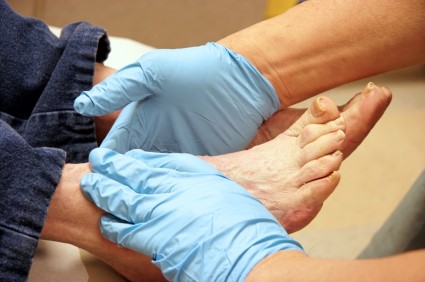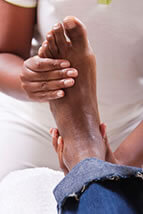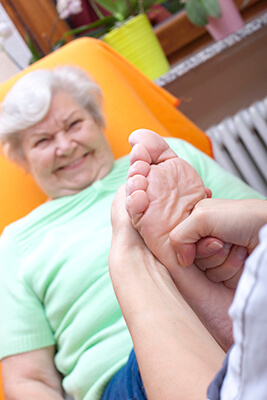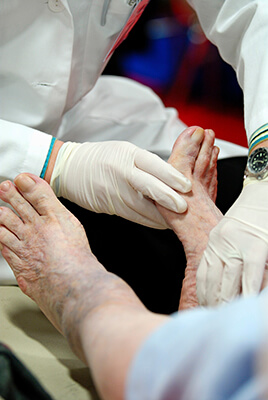





 “If you want to know the state of your health, try looking down.” Poor circulation in a person’s feet can be caused by a variety of things, and it is vitally important not to ignore any hint that this may be happening to you. Symptoms to look out for include cold feet, numbness, pain, or swelling. Diabetes can lead to poor circulation in the extremities and if left untreated, can wreak havoc on your feet. But there are many other reasons for lack of blood flow, including neurological issues, Peripheral Artery Disease (PAD), and smoking, among others. Causes of these symptoms can become serious so it is imperative get to a podiatrist immediately to find out what is going on.
“If you want to know the state of your health, try looking down.” Poor circulation in a person’s feet can be caused by a variety of things, and it is vitally important not to ignore any hint that this may be happening to you. Symptoms to look out for include cold feet, numbness, pain, or swelling. Diabetes can lead to poor circulation in the extremities and if left untreated, can wreak havoc on your feet. But there are many other reasons for lack of blood flow, including neurological issues, Peripheral Artery Disease (PAD), and smoking, among others. Causes of these symptoms can become serious so it is imperative get to a podiatrist immediately to find out what is going on.
Poor circulation is a serious condition and needs immediate medical attention. If you have any concerns with poor circulation in your feet contact one of our podiatrists from Active Foot and Ankle Care, LLC. Our doctors can provide the care you need to keep you pain-free and on your feet.
Poor Circulation in the Feet
Poor blood circulation in the feet and legs is can be caused by peripheral artery disease (PAD), which is the result of a buildup of plaque in the arteries.
Plaque buildup or atherosclerosis results from excess calcium and cholesterol in the bloodstream. This can restrict the amount of blood which can flow through the arteries. Poor blood circulation in the feet and legs are sometimes caused by inflammation in the blood vessels, known as vasculitis.
Causes
Lack of oxygen and oxygen from poor blood circulation restricts muscle growth and development.
It can also cause:
Those who have diabetes or smoke are at greatest risk for poor circulation, as are those who are over 50. If you have poor circulation in the feet and legs it may be caused by PAD, and is important to make changes to your lifestyle in order to reduce risk of getting a heart attack or stroke. Exercise and maintaining a healthy lifestyle will dramatically improve conditions.
As always see a doctor as they will help try and fit a regime that suits you. A doctor will also prescribe you medication which will help for PAD.
If you have any questions please feel free to contact our offices located in New Jersey. We offer the newest diagnostic and treatment technologies for all your foot and ankle needs.
 Ingrown toenails are a common foot problem and occur when the toenail begins growing into the skin on its sides. This, consequently, can lead to infections, swelling and irritation. You can prevent ingrown toenails by cutting your toenails straight across from end to end. Avoid improperly-fitting shoes, as they can squeeze your toes, potentially impacting how your toenails grow. Contact sports such as soccer that require an object to constantly impact the feet can also lead to an increased chance of ingrown toenails. If you think you may have an ingrown toenail, seek the advice of your podiatrist. While at home, soak your toenail in warm water with salt and apply antibiotic ointment afterwards. Avoid any tight bandages or socks.
Ingrown toenails are a common foot problem and occur when the toenail begins growing into the skin on its sides. This, consequently, can lead to infections, swelling and irritation. You can prevent ingrown toenails by cutting your toenails straight across from end to end. Avoid improperly-fitting shoes, as they can squeeze your toes, potentially impacting how your toenails grow. Contact sports such as soccer that require an object to constantly impact the feet can also lead to an increased chance of ingrown toenails. If you think you may have an ingrown toenail, seek the advice of your podiatrist. While at home, soak your toenail in warm water with salt and apply antibiotic ointment afterwards. Avoid any tight bandages or socks.
Ingrown toenails can become painful if they are not treated properly. For more information about ingrown toenails, contact one of our podiatrists from Active Foot and Ankle Care, LLC. Our doctors can provide the care you need to keep you pain-free and on your feet.
Ingrown Toenails
Ingrown toenails occur when a toenail grows sideways into the bed of the nail, causing pain, swelling, and possibly infection.
Causes
Prevention
Because ingrown toenails are not something found outside of shoe-wearing cultures, going barefoot as often as possible will decrease the likeliness of developing ingrown toenails. Wearing proper fitting shoes and using proper cutting techniques will also help decrease your risk of developing ingrown toenails.
Treatment
Ingrown toenails are a very treatable foot condition. In minor cases, soaking the affected area in salt or antibacterial soaps will not only help with the ingrown nail itself, but also help prevent any infections from occurring. In more severe cases, surgery is an option. In either case, speaking to your podiatrist about this condition will help you get a better understanding of specific treatment options that are right for you.
If you have any questions please feel free to contact our offices located in New Jersey. We offer the newest diagnostic and treatment technologies for all your foot and ankle needs.
 Last month was National Diabetes Awareness month, as diabetes is “a worldwide health problem characterized by the body’s inability to break down sugar due to an inefficiency of the hormone insulin.” If left untreated, diabetes can lead to more severe problems such as diabetic ulcers, poor blood circulation, dry and cracking skin, and infections. Proper footwear, routine checks, and seeing your podiatrist are vital toward injury prevention. About “12 percent of those with diabetes will develop plantar ulcers and they’re responsible for approximately 85 percent of amputations of the lower extremities in diabetic patients.” Your podiatrist can help with managing foot hygiene as well as monitoring your blood sugar levels.
Last month was National Diabetes Awareness month, as diabetes is “a worldwide health problem characterized by the body’s inability to break down sugar due to an inefficiency of the hormone insulin.” If left untreated, diabetes can lead to more severe problems such as diabetic ulcers, poor blood circulation, dry and cracking skin, and infections. Proper footwear, routine checks, and seeing your podiatrist are vital toward injury prevention. About “12 percent of those with diabetes will develop plantar ulcers and they’re responsible for approximately 85 percent of amputations of the lower extremities in diabetic patients.” Your podiatrist can help with managing foot hygiene as well as monitoring your blood sugar levels.
Diabetic foot care is important in preventing foot ailments such as ulcers. If you are suffering from diabetes or have any other concerns about your feet, contact one of our podiatrists from Active Foot and Ankle Care, LLC. Our doctors can provide the care you need to keep you pain-free and on your feet.
Diabetic Foot Care
Diabetes affects millions of people every year. Diabetes can damage blood vessels in many parts of the body, including the feet. Because of this, taking care of your feet is essential if you have diabetes, and having a podiatrist help monitor your foot health is highly recommended.
The Importance of Caring for Your Feet
Patients with diabetes should have their doctor monitor their blood levels because blood sugar levels play such a huge role in diabetic care. Monitoring these levels on a regular basis is highly advised.
It is always best to inform your healthcare professional of any concerns you may have regarding your feet, especially for diabetic patients. Early treatment and routine foot examinations are keys to maintaining proper health, especially because severe complications can arise if proper treatment is not applied.
If you have any questions please feel free to contact our offices located in New Jersey. We offer the newest diagnostic and treatment technologies for all your foot and ankle needs.
 As we get older, we become more prone to foot problems. We lose the cushioning in our feet, and our nails and skin become brittle and dry without proper treatment. Poor circulation also becomes a common problem among seniors, leading to an increased risk of foot sores. Proper circulation can be improved with daily exercise. The elderly are also advised to avoid wearing tight socks and sitting for long periods of time, to wear comfortable footwear, and to maintain good foot hygiene. Improperly-fitting shoes can lead to long-term problems such as corns, bunions and calluses.
As we get older, we become more prone to foot problems. We lose the cushioning in our feet, and our nails and skin become brittle and dry without proper treatment. Poor circulation also becomes a common problem among seniors, leading to an increased risk of foot sores. Proper circulation can be improved with daily exercise. The elderly are also advised to avoid wearing tight socks and sitting for long periods of time, to wear comfortable footwear, and to maintain good foot hygiene. Improperly-fitting shoes can lead to long-term problems such as corns, bunions and calluses.
Proper foot care is something many older adults forget to consider. If you have any concerns about your feet and ankles, contact one of our podiatrists from Active Foot and Ankle Care, LLC. Our doctors can provide the care you need to keep you pain-free and on your feet.
The Elderly and their Feet
As we age we start to notice many changes in our body, but the elder population may not notice them right away. Medical conditions may prevent the elderly to take notice of their foot health right away. Poor vision is a lead contributor to not taking action for the elderly.
Common Conditions
Neuropathy – can reduce feeling in the feet, and can hide many life threating medical conditions.
Reduced flexibility – prevents the ability of proper toenail trimming, and foot cleaning. If left untreated, it may lead to further medical issues.
Foot sores – amongst the older population can be serious before they are discovered. Some of the problematic conditions they may face are:
Gouging toenails affecting nearby toe
Shoes that don’t fit properly
Pressure sores
Loss of circulation in legs & feet
Edema & swelling of feet and ankles
Susceptible Infections
Diabetes and poor circulation can cause general loss of sensitivity over the years, turning a simple cut into a serious issue.
If you have any questions please feel free to contact our offices located in New Jersey. We offer the newest diagnostic and treatment technologies for all your foot and ankle needs.






